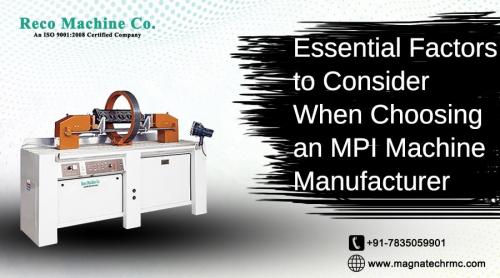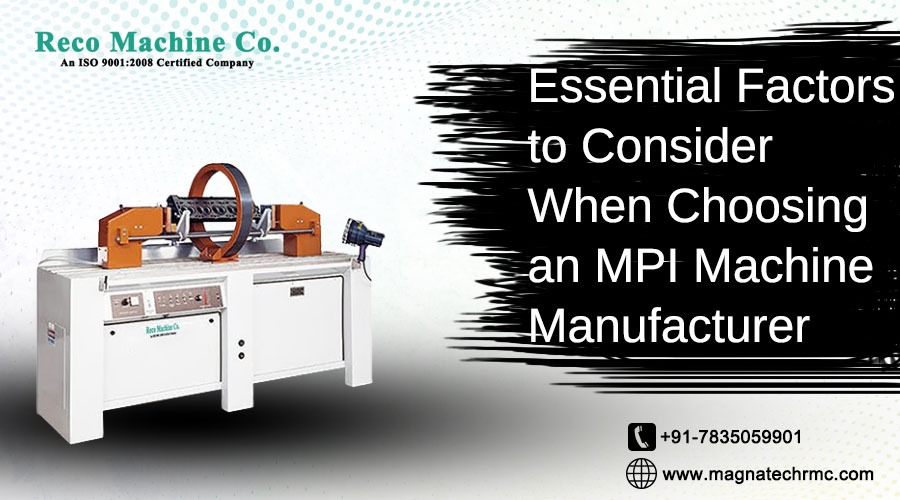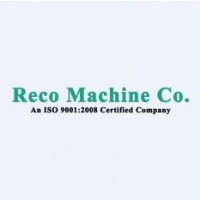Essential Factors to Consider When Choosing an MPI Machine Manufacturer

Magnetic Particle Inspection (MPI) is a critical
non-destructive testing method widely used in various industries to detect
surface and subsurface flaws in ferromagnetic materials. Choosing the right MPI
machine is crucial for ensuring accurate and reliable testing results. In this
article, we will explore the essential factors to consider when selecting an MPI
machine manufacturer to meet the specific needs of your industry and
application.
I.
Industry-Specific Requirements:
Different industries have unique requirements when
it comes to MPI, and the machine you choose should align with the specific
standards and regulations of your industry. Whether it's aviation, automotive,
manufacturing, or oil and gas, the MPI machine must comply with relevant
industry codes and standards. Ensure that the manufacturer has experience
catering to your industry's specific needs and adheres to quality and safety
regulations.
II.
Machine Type and Configuration:
MPI machines come in various types and
configurations, each designed for specific applications. Consider the type of
parts or components you will be inspecting, the size and shape of the
materials, and the testing environment. Whether it's a stationary bench unit,
portable unit, or a customized machine, the chosen configuration should match
your inspection requirements and workflow.
III.
Sensitivity and Detection Capabilities:
The effectiveness of an MPI machine lies in its
sensitivity and detection capabilities. Higher sensitivity allows for the
detection of smaller defects, ensuring a more thorough inspection. Evaluate the
machine's ability to detect both surface and subsurface flaws, and inquire
about its sensitivity settings. A reliable MPI machine should be capable of
providing consistent and accurate results across a range of materials and part
geometries.
IV.
Magnetization Techniques:
MPI machines use various magnetization techniques,
including yoke, coil, and prods. The choice of magnetization technique depends
on the application and the type of defects you need to identify. Yoke
magnetization is common for weld inspections, while coil magnetization is
suitable for larger parts. Prods may be used for localized inspections.
Consider the flexibility and adaptability of the MPI machine in employing
different magnetization techniques based on your testing requirements.
V.
Automation and User-Friendly Interface:
Automation in MPI
machines can significantly enhance productivity and consistency in
testing. Look for machines with automated features such as part handling,
magnetization, and inspection processes. Additionally, a user-friendly
interface is essential for ease of operation and training. Intuitive controls,
clear displays, and programmable settings contribute to efficient use and
reduce the risk of errors.
VI.
Calibration and Accuracy:
Accuracy is paramount in non-destructive testing,
and the MPI machine's calibration plays a crucial role in achieving reliable
results. Choose a manufacturer that emphasizes calibration procedures and
provides documentation to verify the machine's accuracy. Regular calibration
checks and traceability to recognized standards ensure that the MPI machine
consistently performs at the highest level of precision.

VII.
Maintenance and Support:
The longevity and reliability of an MPI machine are
contingent on proper maintenance and timely support. Choose a manufacturer that
offers comprehensive maintenance guidelines and provides readily available
spare parts. Additionally, inquire about the manufacturer's support services,
including training programs, technical assistance, and responsive customer
support. A reliable support system ensures that your MPI machine remains
operational and compliant over its lifecycle.
VIII.
Compliance with International Standards:
MPI machines must adhere to international standards
and specifications to ensure the validity of inspection results. Check whether
the manufacturer's products comply with recognized standards such as ASTM
E1444, ISO 9934, and ASME Boiler and Pressure Vessel Code. Compliance not only
ensures the quality of the machine but also demonstrates the manufacturer's
commitment to industry best practices.
IX.
Customization Options:
Industries and applications can vary significantly,
and a one-size-fits-all approach may not be suitable for every scenario. Choose
a manufacturer that offers customization options to tailor the MPI machine to
your specific needs. Whether it's adapting the machine for unique part
geometries, integrating additional features, or modifying the software,
customization ensures that the machine aligns perfectly with your inspection
requirements.
X. Cost of Ownership:
While the initial cost of an MPI machine is a
consideration, it is crucial to assess the overall cost of ownership. Factor in
ongoing maintenance, calibration, and potential upgrades. A higher initial
investment in a reliable and feature-rich machine may result in lower long-term
costs by reducing downtime, improving efficiency, and ensuring consistent,
accurate inspections.
Selecting the right MPI
machine manufacturer requires careful consideration of
industry-specific requirements, machine type, sensitivity, magnetization
techniques, automation, calibration, maintenance, compliance, customization,
and the overall cost of ownership. By prioritizing these essential factors, you
can make an informed decision that aligns with your organization's
non-destructive testing needs, ensuring the integrity and safety of critical components
in various industries.
Magnatech RMC
is a leading manufacturer specializing in MPI machines for non-destructive
testing. Founded with a vision for precision engineering, the company has
consistently pushed the boundaries of magnetic particle inspection technology.
Renowned for high sensitivity, versatility, and user-friendly interfaces,
Magnatech RMC's MPI machines cater to diverse industries, ensuring reliable
flaw detection and compliance with stringent standards.
Read
also another article:
Post Your Ad Here

Comments